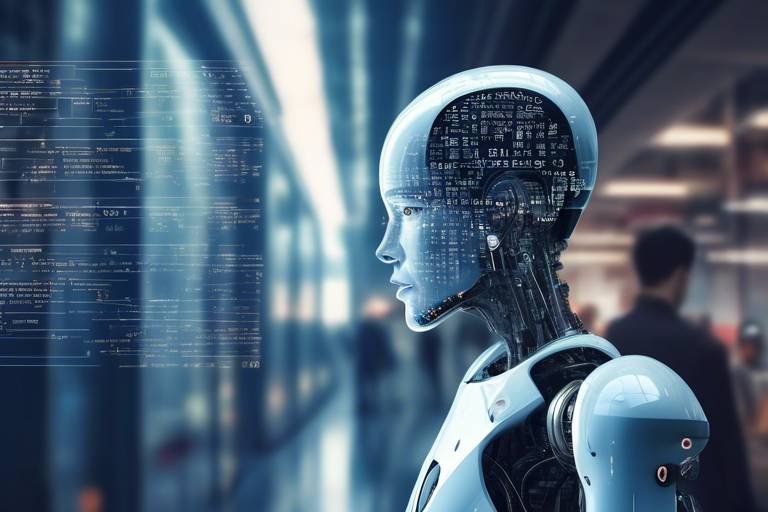Impact of AI on the Future of Video Gaming
The world of video gaming is undergoing a seismic shift thanks to the advent of artificial intelligence (AI). Imagine stepping into a game where the characters not only respond to your actions but also adapt to your play style, creating a unique experience tailored just for you. This is not a distant dream but a reality that is already unfolding. AI is not just enhancing gameplay; it is fundamentally transforming the very fabric of game design, player interaction, and the overall gaming ecosystem. As we dive deeper into this topic, we will explore how AI is revolutionizing the gaming landscape, enriching player experiences, and paving the way for future innovations.
One of the most exciting aspects of AI in gaming is its ability to drive game design forward. Developers are using AI tools to create more complex and engaging worlds, pushing the boundaries of storytelling and gameplay mechanics. For instance, AI can analyze player behavior to adjust narratives dynamically, ensuring that each player's journey feels personal and immersive. This means that instead of following a linear path, players might find themselves in a world that reacts to their choices, creating a sense of agency that is both thrilling and rewarding.
Gone are the days of predictable non-player characters (NPCs) that merely serve as background props. With the power of AI, NPCs now exhibit realistic behaviors and decision-making abilities that make them feel like genuine companions or adversaries. Imagine an NPC that remembers your past interactions, reacts emotionally to your decisions, and even engages in conversations that feel organic and fluid. This level of depth not only enriches the gaming experience but also fosters a deeper emotional connection between players and the game world.
One of the most groundbreaking applications of AI is in procedural content generation. This technology allows for the automatic creation of game content, such as levels, quests, and entire environments. As a result, players can enjoy an almost infinite variety of experiences. Think of it like a never-ending buffet of gaming possibilities; every time you play, you encounter something new and exciting. This keeps gameplay fresh and engaging, ensuring that players remain invested in the game for longer periods.
AI systems are also capable of implementing dynamic difficulty adjustment. What does this mean for players? It means that games can analyze your performance in real-time and adjust the challenge accordingly. If you’re breezing through levels, the game can ramp up the difficulty to keep you on your toes. Conversely, if you're struggling, it can ease up, ensuring that you’re never overwhelmed or bored. This tailored approach to difficulty makes for a more satisfying gaming experience, as players feel continually challenged without hitting a wall of frustration.
Have you ever wished a game could adapt to your unique play style? AI makes this possible by personalizing gaming experiences. Whether it's altering narratives, adjusting challenges, or offering tailored rewards, AI can analyze your behaviors and preferences to create a customized journey. This means that no two players will have the same experience, enhancing overall satisfaction and making each gaming session feel special.
The integration of AI also streamlines the game testing process. Traditionally, testing games for bugs and performance issues is a tedious task that can take up a significant amount of development time. However, AI can automate many of these processes, identifying issues more quickly and efficiently. This leads to more polished final products and allows developers to focus on creativity rather than getting bogged down by technicalities.
As we embrace the benefits of AI in gaming, it is crucial to address the ethical considerations that come with it. With great power comes great responsibility, and the gaming industry must navigate the complexities of data privacy, player manipulation, and the potential for addiction. These discussions are essential to ensure that AI is used responsibly and ethically within the gaming community.
The integration of AI often necessitates the collection of vast amounts of player data. This raises significant concerns about privacy and the ethical implications of monitoring player behavior. Developers must prioritize transparency and consent, ensuring players are aware of what data is being collected and how it is being used. Striking a balance between enhancing player experiences and protecting their privacy is paramount to maintaining trust in the gaming community.
Another pressing concern is the potential for game addiction. AI can create highly engaging experiences that keep players coming back for more. While this is great for business, it raises ethical questions about the responsibility of developers to promote healthy gaming habits. Striking a balance between creating immersive gameplay and ensuring players do not lose themselves in the virtual world is a challenge that the industry must address.
Looking ahead, the role of AI in gaming is expected to expand even further. With advancements in technology, we can anticipate more interactive, immersive, and personalized experiences that redefine how players engage with games. The future is bright, and as AI continues to evolve, the possibilities for innovation in gaming are truly limitless.
- How is AI changing video game design?
AI is enabling developers to create complex worlds and narratives that adapt to player choices, enhancing the overall gaming experience.
- What are NPCs, and how does AI improve them?
Non-player characters (NPCs) are game characters that players do not control. AI allows them to exhibit realistic behaviors and respond dynamically to player actions.
- What is procedural content generation?
It is a method where AI automatically generates game content, leading to unique experiences for players each time they play.
- Are there ethical concerns with AI in gaming?
Yes, concerns about data privacy, player manipulation, and addiction are significant issues that need to be addressed.

AI-Driven Game Design
This article explores how artificial intelligence is transforming video gaming, enhancing player experiences, and shaping the industry’s future through innovative technologies and gameplay mechanics.
Artificial Intelligence is not just a buzzword; it’s a game changer in the world of video game design. Imagine stepping into a universe that feels alive, where every corner you turn reveals something new and unexpected. This is the magic that brings to the table. Developers are leveraging AI to create rich, complex worlds that adapt and evolve based on player interactions. Gone are the days of linear storytelling; now, narratives can twist and turn, allowing players to influence outcomes in ways that feel both personal and impactful.
One of the most exciting aspects of AI in game design is its ability to enhance storytelling. With AI, game developers can craft narratives that are not only engaging but also responsive to individual player choices. For instance, a character’s fate may change based on the decisions you make, leading to a unique gaming experience every time you play. This level of personalization is akin to reading a book where the plot shifts depending on your preferences and actions—how cool is that?
Moreover, AI enables adaptive gameplay mechanics, which means the game can adjust itself based on how you play. If you’re breezing through levels, the game can ramp up the difficulty to keep you challenged. Conversely, if you’re struggling, it can ease off a bit to ensure you don’t feel overwhelmed. This dynamic interaction keeps players engaged and invested, making each session feel tailored just for them.
To illustrate this further, let’s take a look at some key elements of AI-driven game design:
| Element | Description |
|---|---|
| Complex Worlds | AI allows for the creation of expansive and intricate game environments that react to player actions. |
| Dynamic Narratives | Stories that evolve based on player decisions, providing a unique experience each time. |
| Adaptive Mechanics | Gameplay that adjusts in real-time to maintain an optimal level of challenge. |
As we continue to explore the impact of AI on game design, it’s clear that the technology is paving the way for a more immersive and personalized gaming experience. Players are no longer passive participants; they are active creators of their own gaming journeys. This shift not only enhances the enjoyment of games but also fosters a deeper emotional connection between the player and the game world.
In conclusion, AI-driven game design is reshaping how games are created and experienced. With its ability to craft complex narratives, adapt gameplay mechanics, and create vibrant worlds, AI is not just enhancing the player experience but is also setting the stage for the future of gaming. The possibilities are endless, and as technology continues to evolve, we can only imagine what groundbreaking innovations lie ahead.
- How does AI improve game design?
AI enhances game design by creating complex worlds, adaptive gameplay, and personalized narratives, making gaming experiences unique for each player. - Can AI change the storyline of a game?
Yes, AI can create dynamic narratives that change based on player choices, leading to different outcomes in the game. - What are the benefits of adaptive gameplay?
Adaptive gameplay keeps players engaged by adjusting the difficulty level in real-time, ensuring they remain challenged without becoming frustrated.

Enhanced NPC Behavior
In the realm of video gaming, the evolution of non-player characters (NPCs) has been nothing short of revolutionary, primarily driven by advancements in artificial intelligence (AI). Gone are the days when NPCs merely followed pre-programmed scripts or responded to player actions in predictable ways. Today, AI empowers these characters to exhibit behaviors that mimic real human interactions, creating a gaming experience that is not only immersive but also deeply engaging.
Imagine walking through a bustling medieval town in your favorite RPG. NPCs are no longer just background figures; they are vibrant, dynamic entities with their own goals, emotions, and reactions. With AI, these characters can analyze player actions and adapt their behavior accordingly. For instance, if a player frequently engages in combat, NPCs might react with fear or admiration, altering their dialogues and interactions based on the player's reputation. This level of dynamic interaction enhances the storytelling aspect of games, making each player's journey unique.
One of the most exciting developments in NPC behavior is the use of machine learning algorithms. These algorithms allow NPCs to learn from player behavior over time, enabling them to develop strategies, alliances, or rivalries. For example, if a player consistently helps a particular faction, NPCs from that faction may begin to trust the player more, offering better quests or rewards. Conversely, if a player chooses to betray a faction, NPCs may react with hostility, creating a ripple effect that can dramatically alter the game's narrative.
Furthermore, AI-driven NPCs can engage in conversational interactions that feel natural and spontaneous. Using natural language processing, these characters can understand player inputs and respond in ways that make sense within the context of the game world. This creates a more authentic experience, where players feel as though they are genuinely interacting with living characters rather than just programmed responses. Imagine asking an NPC about local lore or seeking advice on a quest and receiving a thoughtful, context-aware reply. This is the future of NPC interactions, and it’s incredibly exciting!
However, with great power comes great responsibility. As NPCs become more advanced, developers must consider the implications of such realistic behavior. For instance, how do we ensure that players do not exploit these systems? What ethical guidelines should govern NPC interactions to prevent manipulation or negative player experiences? These are crucial questions that the gaming industry must address as it embraces AI technology.
In conclusion, the enhancement of NPC behavior through AI not only enriches player experiences but also sets the stage for a new era of storytelling in video games. As developers continue to innovate, we can expect NPCs to become even more integral to gameplay, shaping narratives and player choices in ways we have only begun to imagine.
- How does AI improve NPC interactions? AI allows NPCs to learn from player behavior, making their responses more dynamic and contextually relevant.
- Can NPCs remember player actions? Yes, advanced AI can enable NPCs to remember past interactions, influencing future behavior and dialogue.
- What are the ethical concerns regarding AI in gaming? Ethical concerns include data privacy, player manipulation, and the potential for addiction.

Procedural Content Generation
Imagine diving into a vast ocean of possibilities where every wave brings a new adventure. This is the magic of (PCG) in video gaming. With the help of artificial intelligence, developers can create expansive worlds that evolve and change with every playthrough. Instead of being confined to static environments, players can explore unique landscapes, encounter different quests, and meet a variety of characters, all generated on the fly by sophisticated algorithms. This not only keeps the gameplay fresh but also invites players to engage in endless exploration.
At its core, procedural content generation relies on algorithms that use predefined rules to create content dynamically. For instance, a game might use PCG to generate an entire forest, where the trees, wildlife, and even the terrain vary every time you enter. This unpredictability adds a layer of excitement and discovery, reminiscent of opening a new chapter in your favorite book, where each page reveals something unexpected.
One of the most thrilling aspects of PCG is its ability to enhance replayability. Players often find themselves returning to a game, eager to experience the new challenges and environments that await them. This is particularly evident in games like Rogue-like titles, where each run is different, and players must adapt their strategies on the fly. The thrill of not knowing what lies ahead is what keeps the adrenaline pumping.
Moreover, PCG can be utilized in various aspects of game design, such as:
- Level Design: Creating unique levels that challenge players in different ways.
- Quest Generation: Offering players new missions that are tailored to their play style.
- Environment Creation: Building diverse worlds that feel alive and reactive.
However, while the potential of procedural content generation is immense, it’s essential to strike a balance. Too much randomness can lead to frustrating experiences, where players feel lost or overwhelmed. Developers must carefully craft the algorithms to ensure that the generated content maintains a sense of coherence and purpose. Think of it like seasoning a dish; just the right amount can elevate the flavors, but too much can ruin the meal.
In summary, procedural content generation is reshaping the gaming landscape by offering players a unique blend of unpredictability and engagement. As AI technology continues to advance, we can only expect the scope and scale of PCG to expand, leading to even more innovative gaming experiences that keep players on the edge of their seats.

Dynamic Difficulty Adjustment
Dynamic Difficulty Adjustment (DDA) is one of the most exciting innovations that artificial intelligence has brought to the world of video gaming. Imagine you're deep into an epic quest, battling fierce monsters and solving intricate puzzles, but suddenly, the game feels either too easy or impossibly hard. This is where DDA steps in, acting like a skilled game master who senses your frustration or boredom and adjusts the challenge accordingly. It's like having a personal trainer for your gaming experience, ensuring that you’re always on your toes without feeling overwhelmed.
The magic of DDA lies in its ability to analyze player performance in real-time. AI systems monitor various metrics, such as how quickly you defeat enemies, how often you die, or even how you approach problem-solving within the game. Based on this data, the game can make instant adjustments to the difficulty level. For instance, if you’re breezing through levels like a pro, the AI might spawn tougher enemies or introduce more complex puzzles. Conversely, if you’re struggling, it might provide you with extra health packs or slightly weaken your foes. This adaptive approach keeps players engaged, ensuring they experience the thrill of challenge without the frustration of failure.
One of the key benefits of DDA is its ability to cater to a diverse audience. Gamers come in all shapes and sizes, with varying skill levels and play styles. Some players thrive on intense challenges, while others prefer a more relaxed experience. DDA allows developers to create a single game that can appeal to both types of players. Think of it as a buffet where everyone can pick what they like without feeling left out. This flexibility not only enhances player satisfaction but also promotes longer play sessions, as players are less likely to abandon a game that feels tailored to their abilities.
However, implementing DDA is not without its challenges. Developers must strike a delicate balance between adjusting difficulty and maintaining the integrity of the game. If the adjustments are too noticeable, players might feel that their achievements are undermined, leading to a lack of satisfaction. To address this, many games incorporate subtle changes that players may not even notice, allowing them to feel a sense of accomplishment while still benefiting from the adjustments. This nuanced approach ensures that the gaming experience remains rewarding and engaging.
As we look to the future, the potential of DDA is immense. With advancements in AI technology, we can expect even more sophisticated systems that will analyze not just performance metrics but also emotional cues from players. Imagine a game that can detect your frustration through your gameplay patterns and adjust the difficulty to help you regain your confidence. This level of personalization could revolutionize how we interact with video games, making them more inclusive and enjoyable for everyone.
- What is Dynamic Difficulty Adjustment (DDA)? DDA is a system that automatically adjusts the difficulty of a game based on the player's performance to enhance the gaming experience.
- How does DDA work? DDA uses AI algorithms to monitor player actions and performance in real-time, making adjustments to the game’s difficulty as needed.
- Can DDA make a game too easy or too hard? While DDA aims to maintain an optimal challenge, poorly implemented systems can lead to a lack of satisfaction. Developers strive for a balance to keep players engaged.
- Will DDA change the way I play games? Yes! DDA personalizes your gaming experience, making it more enjoyable and tailored to your unique play style.

Personalized Gaming Experiences
Imagine diving into a game where every choice you make shapes the world around you. This is the magic of , and thanks to artificial intelligence, it’s becoming a reality. AI has the incredible ability to analyze your play style, preferences, and even your emotional responses, allowing developers to tailor the gaming experience specifically for you. It’s like having a personal game designer who knows exactly what you want!
At the heart of this personalization lies complex algorithms that track your decisions and reactions. For example, if you tend to favor stealth over brute force, the game can adjust its challenges accordingly, presenting you with scenarios that require cunning and strategy rather than just firepower. This means that no two players will have the same experience, leading to a richer, more engaging gameplay. You might find yourself facing different quests, unique character interactions, and tailored story arcs that reflect your choices.
Moreover, personalization isn’t just limited to gameplay mechanics. It extends to the narrative as well. AI can create storylines that resonate with your interests, making the experience feel more immersive. Imagine a game that evolves based on your decisions, where the plot twists and turns in unexpected ways that feel uniquely yours. This kind of dynamic storytelling keeps players coming back for more, eager to see how their choices will shape the world and influence the characters.
To illustrate the impact of personalized gaming experiences, consider the following table:
| Aspect | Traditional Gaming | AI-Personalized Gaming |
|---|---|---|
| Player Choices | Limited options based on predefined paths | Dynamic responses based on player behavior |
| Storyline | Fixed narrative for all players | Adaptive narrative that changes with player decisions |
| Gameplay Challenges | Static difficulty levels | Real-time adjustments to maintain optimal challenge |
| Character Interactions | Generic responses from NPCs | Unique dialogues based on player history |
This personalization not only enhances your gaming experience but also fosters a deeper emotional connection to the game. When you see the consequences of your choices unfold in a way that feels personal, it creates a sense of ownership over the narrative. You’re not just a passive observer; you’re an active participant in a story that is uniquely yours.
However, with great power comes great responsibility. Developers must tread carefully to ensure that the personalization doesn’t veer into manipulation. It’s essential that players feel in control of their experience, rather than being guided too heavily by AI algorithms. Striking the right balance between engagement and autonomy is crucial for the future of personalized gaming.
- How does AI personalize gaming experiences? AI analyzes player behavior, choices, and preferences to tailor gameplay, challenges, and narratives uniquely for each player.
- Will personalized gaming experiences lead to more addictive games? While personalization can enhance engagement, it’s important for developers to promote healthy gaming habits and avoid manipulation.
- Are there any privacy concerns with AI in gaming? Yes, the collection of player data for personalization raises important questions about privacy and data security.

AI in Game Testing
Artificial Intelligence (AI) is not just changing how games are made; it's also revolutionizing the testing phase, which is crucial for delivering a seamless gaming experience. Traditionally, game testing involved human testers who would play through levels, looking for bugs and performance issues. However, with the advent of AI, this process has become significantly more efficient and effective. Imagine having a tireless assistant that can run through thousands of scenarios in mere minutes, identifying glitches and inconsistencies that might take human testers days to uncover. Sounds like a game-changer, right?
One of the most exciting aspects of AI in game testing is its ability to automate the tedious and often repetitive tasks that testers face. AI algorithms can simulate player behavior, allowing them to explore every nook and cranny of a game world. This means that developers can receive real-time feedback on performance issues, graphical glitches, and gameplay mechanics. With AI, the testing phase can be streamlined, leading to faster turnaround times and ultimately, a more polished final product.
Furthermore, AI can analyze vast amounts of data to evaluate user experiences. It can track player interactions and assess how different elements of the game are functioning. For instance, if players consistently struggle with a particular level, AI can highlight this issue, prompting developers to make necessary adjustments. This data-driven approach not only enhances the quality of the game but also allows for a more tailored experience for players, as developers can address specific pain points before the game even hits the shelves.
Moreover, consider the following key benefits of integrating AI into game testing:
- Increased Efficiency: AI can perform tests faster than human testers, allowing for more extensive coverage in a shorter period.
- Enhanced Accuracy: AI algorithms can detect bugs that might go unnoticed by human eyes, ensuring a higher quality product.
- Cost-Effective: Automating the testing process can reduce labor costs and free up human testers to focus on more complex issues.
In summary, the incorporation of AI in game testing is transforming the landscape of game development. By automating repetitive tasks, providing real-time feedback, and enhancing overall accuracy, AI is helping developers create more engaging and polished gaming experiences. As this technology continues to evolve, we can expect even more innovative solutions that will further streamline the testing process and elevate the quality of video games to new heights.
- What is AI in game testing? AI in game testing refers to the use of artificial intelligence technologies to automate and enhance the process of testing video games for bugs and performance issues.
- How does AI improve game testing efficiency? AI can simulate player behavior and run extensive tests much faster than human testers, allowing for quicker identification of issues and a more thorough testing process.
- Can AI replace human testers? While AI can handle many repetitive tasks and enhance testing accuracy, human testers are still essential for evaluating gameplay experience and providing creative insights.
- What are the benefits of using AI in game testing? Benefits include increased efficiency, enhanced accuracy, cost-effectiveness, and the ability to provide real-time feedback to developers.

Ethical Considerations of AI in Gaming
As the gaming industry continues to evolve with the integration of artificial intelligence, it is crucial to address the ethical considerations that accompany these advancements. The use of AI in gaming can significantly enhance player experiences, but it also raises important questions about data privacy, player manipulation, and the potential for addiction. These concerns prompt a deeper examination of how developers and companies should approach the implementation of AI technologies.
One of the primary issues is player data privacy. To create personalized experiences, AI often requires the collection of vast amounts of player data. This data can include everything from gameplay habits to personal preferences, leading to concerns about how this information is stored, used, and shared. Players may feel uneasy knowing that their every move is being monitored, raising the question: How much are we willing to sacrifice our privacy for a tailored gaming experience? Developers must strike a balance between enhancing gameplay and respecting players' rights to privacy.
Moreover, the potential for player manipulation is another ethical dilemma. AI can analyze player behavior and adjust game mechanics to keep players engaged. While this can lead to a more enjoyable experience, it can also create scenarios where players are subtly nudged toward spending more money or investing more time than they intended. This manipulation can lead to unhealthy gaming habits, making it essential for developers to consider the implications of their AI-driven designs.
In light of these concerns, it is vital for the gaming industry to establish ethical guidelines regarding the use of AI. Some possible considerations include:
- Transparency: Developers should be open about how player data is collected and used.
- Consent: Players should have the option to opt-in or opt-out of data collection practices.
- Balance: Games should promote healthy gaming habits and avoid exploitative mechanics.
As we look to the future, the role of AI in gaming will undoubtedly expand. However, it is the responsibility of developers, companies, and players alike to navigate these ethical waters carefully. By fostering a culture of responsible AI usage, we can ensure that the gaming experience remains enjoyable, immersive, and respectful of individual rights.
- What are the main ethical concerns regarding AI in gaming?
The primary concerns include data privacy, player manipulation, and the potential for addiction. - How does AI affect player data privacy?
AI requires extensive data collection to personalize experiences, which raises questions about how that data is managed and shared. - What can developers do to promote ethical AI usage?
Developers should prioritize transparency, consent, and balance in their AI implementations to protect players' rights.

Player Data Privacy
In the ever-evolving landscape of video gaming, the integration of artificial intelligence brings with it a host of benefits, but it also raises significant concerns regarding . As games become more sophisticated, they often require the collection of vast amounts of player data to enhance experiences. This data can include everything from gameplay statistics to personal information, and while it’s used to create tailored gaming experiences, it also poses a risk to players' privacy.
Imagine stepping into a game where every move you make is tracked and analyzed to provide a customized experience. Sounds cool, right? But what happens when that data falls into the wrong hands? The reality is that the more data collected, the greater the responsibility developers have to protect it. This leads to a crucial question: How can gaming companies ensure that player data is handled ethically and securely?
Many gamers are unaware of the extent to which their data is being collected and used. This lack of awareness can lead to feelings of vulnerability, as players may not fully understand the implications of sharing their information. To address these concerns, developers must be transparent about their data collection practices. Here are some key points that should be communicated clearly to players:
- What data is collected? - Players should know exactly what information is being gathered.
- How is the data used? - Transparency about the purpose of data collection is essential.
- Who has access to the data? - Players should be informed about third parties that may have access to their information.
- What measures are in place to protect data? - Developers must explain the security protocols in place to safeguard player information.
Moreover, the ethical implications of monitoring player behavior cannot be overlooked. While AI can enhance gameplay, it can also lead to manipulative practices that prioritize profit over player well-being. The potential for creating addictive gaming experiences raises the question of whether developers are crossing a line. It’s crucial for the industry to strike a balance between leveraging AI for engagement and ensuring that players are not exploited.
As we look to the future, it’s clear that the conversation around will continue to evolve. Gamers are becoming more educated about their rights and the importance of data security. This shift in awareness is prompting developers to adopt more responsible practices. The gaming community must advocate for stronger regulations and standards that protect player data while still allowing for innovative uses of AI.
Q: What types of data do video games collect?
A: Video games can collect various types of data, including gameplay statistics, player preferences, location data, and even personal information if linked to accounts.
Q: How can I protect my data while gaming?
A: To protect your data, always read the privacy policy of the games you play, use strong passwords, and be cautious about sharing personal information.
Q: Are there regulations in place to protect player data?
A: Yes, there are regulations like the GDPR in Europe that aim to protect personal data. However, enforcement and compliance can vary by region and company.
Q: What should I do if I feel my data has been compromised?
A: If you suspect your data has been compromised, change your passwords immediately, contact the game developer, and monitor your accounts for any suspicious activity.

AI and Game Addiction
The advent of artificial intelligence in video gaming has undoubtedly transformed the landscape of entertainment, creating experiences that are not just engaging but also deeply immersive. However, with this level of engagement comes a significant concern—the potential for game addiction. As AI systems enhance gameplay mechanics, they can inadvertently lead players into a cycle of compulsive gaming behavior. Think of it like a double-edged sword; on one side, you have the thrill of innovative gameplay, and on the other, the risk of losing track of time and reality.
AI algorithms are designed to keep players hooked by analyzing their behaviors and preferences. This means that games can adapt to provide the most enticing challenges and rewards tailored to individual players. While this personalization can enhance enjoyment, it also raises a critical question: Are we crossing the line from engagement to addiction? The line can be thin, and the allure of a game that knows exactly how to keep you entertained can make it difficult to step away.
Consider the mechanics of dynamic difficulty adjustment. AI can monitor a player's performance and adjust the game's difficulty in real-time, ensuring that the experience remains challenging yet achievable. While this is fantastic for maintaining player interest, it can also lead to prolonged gaming sessions, as players may feel compelled to continue playing to conquer the next challenge. In essence, the game becomes a rewarding cycle that can be hard to break.
Moreover, the integration of AI in gaming can create a feedback loop where players are constantly rewarded for their engagement. This can lead to a situation where players prioritize gaming over other important aspects of their lives, such as social interactions, work, or even their mental health. The risk of addiction becomes more pronounced when the game is designed to trigger feelings of achievement and satisfaction, making it difficult for players to recognize when they need to take a break.
To address these concerns, it is crucial for game developers to consider the ethical implications of AI in gaming. They must find a balance between creating engaging experiences and promoting healthy gaming habits. For instance, implementing features that encourage players to take breaks or providing reminders about the time spent in-game can help mitigate the risk of addiction. Additionally, developers can incorporate educational elements that raise awareness about the signs of gaming addiction, thus empowering players to make informed choices.
In conclusion, while AI has the potential to revolutionize gaming, it is essential to tread carefully. The responsibility lies with both developers and players to ensure that the joy of gaming does not come at the expense of well-being. As we continue to explore the possibilities of AI in gaming, fostering a culture of responsible gaming will be vital in preventing addiction and ensuring that gaming remains a healthy and enjoyable pastime.
- What is game addiction? Game addiction refers to a condition where an individual becomes excessively engaged in video games, leading to negative impacts on their daily life.
- How does AI contribute to game addiction? AI personalizes gameplay experiences, making them highly engaging and often leading players to spend excessive amounts of time playing.
- What can developers do to prevent game addiction? Developers can implement features that encourage breaks, educate players on gaming habits, and design games with ethical considerations in mind.
- Are there signs of gaming addiction? Yes, signs include neglecting responsibilities, losing interest in other activities, and feeling anxious when not playing.

The Future of AI in Gaming
This article explores how artificial intelligence is transforming video gaming, enhancing player experiences, and shaping the industry’s future through innovative technologies and gameplay mechanics.
AI is revolutionizing game design by enabling developers to create more complex and engaging worlds, enhancing storytelling, and personalizing player experiences through adaptive gameplay mechanics.
With AI, non-player characters (NPCs) exhibit more realistic behaviors and decision-making abilities, creating immersive environments and dynamic interactions that enrich the overall gaming experience.
AI algorithms allow for procedural generation of game content, leading to endless possibilities in level design, quests, and environments, thus keeping gameplay fresh and engaging for players.
AI systems can analyze player performance in real-time, adjusting difficulty levels to maintain an optimal challenge, ensuring players remain engaged without feeling overwhelmed or bored.
AI enables games to adapt to individual player preferences, tailoring narratives, challenges, and rewards based on unique play styles and behaviors, enhancing overall satisfaction.
Artificial intelligence streamlines the game testing process by automating bug detection, performance evaluation, and user experience assessments, leading to more polished final products and reduced development time.
As AI technology evolves, ethical concerns arise regarding data privacy, player manipulation, and the potential for addiction, prompting discussions on responsible AI usage in the gaming industry.
The integration of AI often requires collecting vast amounts of player data, raising concerns about privacy and the ethical implications of monitoring player behavior for improved experiences.
The use of AI to create highly engaging experiences can lead to concerns about game addiction, necessitating a balance between immersive gameplay and promoting healthy gaming habits.
Looking ahead, the role of AI in gaming is expected to expand significantly. Imagine a world where games are not just played but experienced in ways we can hardly fathom today. With advancements in AI, we are on the brink of creating more interactive, immersive, and personalized experiences that will redefine how players engage with games. For instance, AI could analyze a player’s emotional state through their in-game choices and adapt the storyline accordingly. This means that every player's journey could be uniquely tailored, making each gaming experience feel like a personal adventure.
Moreover, as AI continues to evolve, we might see the emergence of fully autonomous NPCs that learn and adapt over time, creating a living world that reacts to player actions in a way that feels organic and real. This could lead to gameplay where the environment and characters are not just backdrops but integral parts of the storytelling, making each session feel fresh and unpredictable.
To illustrate the potential future of AI in gaming, consider the following table that outlines some exciting possibilities:
| AI Application | Description |
|---|---|
| Adaptive Storytelling | AI-driven narratives that change based on player choices and emotions. |
| Smart NPCs | Non-player characters that learn from player actions and evolve over time. |
| Realistic Environments | Worlds that respond dynamically to player interactions, creating a sense of immersion. |
| Enhanced Multiplayer Experiences | AI matchmaking systems that create balanced teams based on player skills and styles. |
As we venture further into this technological age, the fusion of AI and gaming is not just a trend; it’s a revolution. The possibilities are endless, and the gaming landscape will undoubtedly become richer, more engaging, and more personalized. Who knows? In a few years, we might be playing games that feel more like living, breathing entities than static experiences, pulling us into their worlds like never before.
- How will AI change the way games are developed? AI will streamline the development process, allowing for faster creation of complex game worlds and more engaging narratives.
- Can AI help prevent game addiction? Yes, by analyzing player behavior, AI can implement features that encourage healthier gaming habits.
- What are the ethical concerns surrounding AI in gaming? Key concerns include data privacy, potential manipulation of player behavior, and the risk of addiction.
- Will AI make games too easy? Not necessarily; AI can adjust difficulty levels dynamically to provide an optimal challenge for each player.
Frequently Asked Questions
- How is AI changing video game design?
AI is transforming video game design by enabling developers to create more complex and engaging worlds. It enhances storytelling and personalizes player experiences through adaptive gameplay mechanics, allowing games to respond dynamically to how players interact with them.
- What improvements have been made in NPC behavior due to AI?
With AI, non-player characters (NPCs) now exhibit more realistic behaviors and decision-making abilities. This leads to immersive environments where players can enjoy dynamic interactions, making the overall gaming experience feel more lifelike and engaging.
- What is procedural content generation and how does it work?
Procedural content generation uses AI algorithms to create game content on the fly. This means that levels, quests, and environments can be generated randomly, providing endless possibilities and keeping gameplay fresh and exciting for players.
- How does dynamic difficulty adjustment enhance gameplay?
Dynamic difficulty adjustment allows AI systems to analyze a player's performance in real-time. By adjusting the difficulty level accordingly, the game ensures that players remain challenged without becoming overwhelmed or bored, maintaining a balanced and enjoyable experience.
- Can AI personalize gaming experiences for players?
Absolutely! AI can adapt games to individual player preferences by tailoring narratives, challenges, and rewards based on unique play styles and behaviors. This personalization significantly enhances overall player satisfaction and engagement.
- How does AI streamline the game testing process?
AI automates various aspects of game testing, such as bug detection and performance evaluation. This leads to more polished final products and reduces development time, allowing developers to focus on creating a better gaming experience.
- What ethical concerns arise from AI in gaming?
As AI technology evolves, ethical concerns about data privacy, player manipulation, and potential addiction have emerged. These issues prompt discussions on the responsible use of AI in the gaming industry to protect players and ensure a healthy gaming environment.
- How does player data privacy relate to AI in gaming?
The integration of AI often involves collecting large amounts of player data, raising significant privacy concerns. It's crucial for game developers to address these ethical implications and ensure that player behavior monitoring is done responsibly.
- Can AI contribute to game addiction?
Yes, the use of AI to create highly engaging experiences can lead to concerns about game addiction. It's essential to find a balance between providing immersive gameplay and promoting healthy gaming habits among players.
- What does the future hold for AI in gaming?
The role of AI in gaming is expected to expand dramatically, leading to more interactive, immersive, and personalized experiences. As advancements continue, players can look forward to a redefined way of engaging with their favorite games.



















